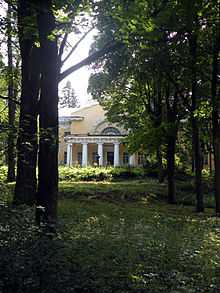Illarion Ivanovich Vorontsov-Dashkov

Count Illarion Ivanovich Vorontsov-Dashkov (27 May 1837 – 15 January 1916) was a notable representative of the Vorontsov family. He served as Minister of Imperial Properties in 1881-97 and the General Governor of Caucasus in 1905-15.
Illarion Vorontsov was born on 27 May 1837 in St. Petersburg. He took part in the conquest of Central Asia in the 1860s and was appointed Major General in 1866. He was in charge of the Hussar regiment of the Leub Guard in 1867-74. He was on friendly terms with the future Alexander III of Russia and, following his father's assassination, established a counter-revolutionary squad, or "holy druzhina", whose members included Konstantin Pobedonostsev, Nicholas Pavlovich Ignatiev, and Mikhail Katkov.
Alexander III put Vorontsov-Dashkov in charge of the imperial court and made him Full General of Cavalry. He also was made responsible for imperial stud farms and vineyards. Following Nicholas II's coronation, he was dislodged from the office of Minister of Imperial Properties but was appointed to the State Council of Imperial Russia instead. The Russian Revolution of 1905 recalled Vorontsov to active service, and he ascended to the helm of the Viceroyalty of the Caucasus.[1]
His job drove him close to a mental breakdown. On 21 November 1905 twenty-five Azeris were shot by Armenians in Tiflis. Illarion was so desperate he gave 500 guns to the Mensheviks to keep the peace.[2]
He was officially in charge of the victorious Russian forces in the Battle of Sarikamis during the early months of World War I, although the effective command lay with General Alexander Myshlayevsky. In September 1915 he was removed from command and replaced with Grand Duke Nicholas.[3] He died on 15 January 1916 in his Vorontsov Palace.
His youngest son Alexander's descendents represent the only continuation of the Vorontsov family in the male line.
Awards and honours

- 1861 - Order of St. Anna, 4th class
- 04/06/1862 - Gold Sword for Bravery
- 1864 - Order of St. Anna, 3rd class
- 1865 - Order of St. Vladimir, 4th class with swords and bow
- 27 June 1867 - Order of St. George, 4th class, for distinguished service during the war
- 1867 - Order of St. Vladimir, 3rd class with swords
- 1868 - Order of St. Stanislaus, 1st class
- 1870 - Order of St. Anna, 1st class
- 1874 - Order of St. Vladimir, 2nd class
- 1878 - Order of the White Eagle, with swords
- 1883 - Order of St. Alexander Nevsky
- 1888 - Order of St. Alexander Nevsky with diamonds
- 1894 - Order of St. Vladimir, 1st class
- 14 May 1896 - Order of St. Andrew
- 1904 - Order of St. Andrew with diamonds
- 1908 - awarded portraits of the Emperors Alexander II and Alexander III with diamonds, to be worn on the chest
- 21 February 1913 - awarded portrait of Emperor Alexander III with diamonds, to be worn on the chest
- 15 August 1915 Order of St. George, 3rd class - "For the valiant skilful leadership of the Caucasian Army, whose heroic exploits achieved brilliant military success in actions against the Turks"
Ancestry
| Ancestors of Prince Nicholas Romanovich of Russia | ||||||||||||||||||||||||||||||||||||||||||||||||||||||||||||||||||||||||||||||||||||||||||||||||||||||||||||||||||||||||||||||||||||||||||||||||||||||||||||||||||||||||||||||||||||||||||||||||||||||||||||||||||||||||||||||||||||||||||||||||||||||||||||||||||||||||||||||||||||||||||||||||||||||||||||||||||||||||||||||||||||||||||||||||||||||||||||||||||||||||||||||||||||||||||||||||||||||||||||||||||||||||||||||||||||||||||||||||||||||||||||||||||||||||||||||||||||||||||||||||||||||||||||||||||||||||||||||||||
|---|---|---|---|---|---|---|---|---|---|---|---|---|---|---|---|---|---|---|---|---|---|---|---|---|---|---|---|---|---|---|---|---|---|---|---|---|---|---|---|---|---|---|---|---|---|---|---|---|---|---|---|---|---|---|---|---|---|---|---|---|---|---|---|---|---|---|---|---|---|---|---|---|---|---|---|---|---|---|---|---|---|---|---|---|---|---|---|---|---|---|---|---|---|---|---|---|---|---|---|---|---|---|---|---|---|---|---|---|---|---|---|---|---|---|---|---|---|---|---|---|---|---|---|---|---|---|---|---|---|---|---|---|---|---|---|---|---|---|---|---|---|---|---|---|---|---|---|---|---|---|---|---|---|---|---|---|---|---|---|---|---|---|---|---|---|---|---|---|---|---|---|---|---|---|---|---|---|---|---|---|---|---|---|---|---|---|---|---|---|---|---|---|---|---|---|---|---|---|---|---|---|---|---|---|---|---|---|---|---|---|---|---|---|---|---|---|---|---|---|---|---|---|---|---|---|---|---|---|---|---|---|---|---|---|---|---|---|---|---|---|---|---|---|---|---|---|---|---|---|---|---|---|---|---|---|---|---|---|---|---|---|---|---|---|---|---|---|---|---|---|---|---|---|---|---|---|---|---|---|---|---|---|---|---|---|---|---|---|---|---|---|---|---|---|---|---|---|---|---|---|---|---|---|---|---|---|---|---|---|---|---|---|---|---|---|---|---|---|---|---|---|---|---|---|---|---|---|---|---|---|---|---|---|---|---|---|---|---|---|---|---|---|---|---|---|---|---|---|---|---|---|---|---|---|---|---|---|---|---|---|---|---|---|---|---|---|---|---|---|---|---|---|---|---|---|---|---|---|---|---|---|---|---|---|---|---|---|---|---|---|---|---|---|---|---|---|---|---|---|---|---|---|---|---|---|---|---|---|---|---|---|---|---|---|---|---|---|---|---|---|---|---|---|---|---|---|---|---|---|---|---|---|---|---|---|---|---|---|---|---|---|---|---|---|---|---|---|---|---|---|---|---|---|---|---|---|---|---|---|---|---|---|---|---|---|---|---|---|---|---|---|---|---|---|---|---|---|---|---|---|---|---|---|---|---|---|---|---|---|---|---|---|---|---|---|---|---|---|---|---|---|---|---|---|---|---|---|---|---|---|---|---|---|---|
| ||||||||||||||||||||||||||||||||||||||||||||||||||||||||||||||||||||||||||||||||||||||||||||||||||||||||||||||||||||||||||||||||||||||||||||||||||||||||||||||||||||||||||||||||||||||||||||||||||||||||||||||||||||||||||||||||||||||||||||||||||||||||||||||||||||||||||||||||||||||||||||||||||||||||||||||||||||||||||||||||||||||||||||||||||||||||||||||||||||||||||||||||||||||||||||||||||||||||||||||||||||||||||||||||||||||||||||||||||||||||||||||||||||||||||||||||||||||||||||||||||||||||||||||||||||||||||||||||||
References
- ↑ W.E.D. Allen and Paul Muratoff, Caucasian Battlefields, A History of Wars on the Turco-Caucasian Border, 1828-1921, 242
- ↑ Simon Sebag Montefiore, Young Stalin, page 122.
- ↑ W.E.D. Allen and Paul Muratoff, Caucasian Battlefields, A History of Wars on the Turco-Caucasian Border, 1828-1921, 322
External links
|